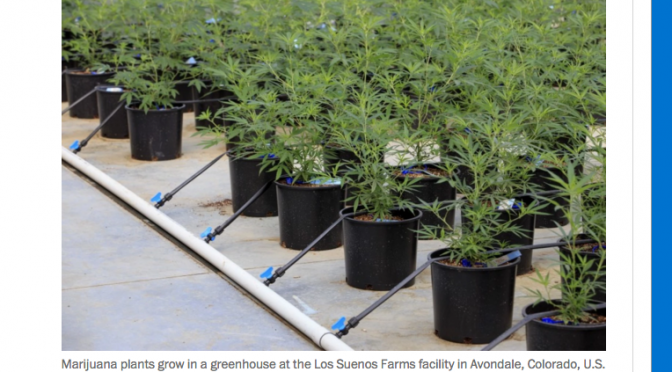The Supreme Court’s decision today to toss out a lawsuit that could have brought Colorado’s legal marijuana boom to a screeching halt hasn’t deterred opponents of the national legalization effort.
Already, the plaintiffs and their supporters are looking to regroup. “The Court’s decision does not bar additional challenges to Colorado’s scheme in federal district court,” said Nebraska Attorney General Doug Peterson in a statement.
Oklahoma and Nebraska asked the Supreme Court to hear a challenge to Colorado’s marijuana legalization framework, saying that the state’s legalization regime was causing marijuana to flow across the borders into their own states, creating law enforcement headaches.
But by a 6-2 majority, the Supreme Court declined to hear the case, without comment.
[Supreme Court turns down case that challenges Colorado marijuana law]
In a statement, Peterson’s office said it would work with Oklahoma and other states “to determine the best next steps toward vindicating the rule of law.”
Other opponents are remaining optimistic, as well. “It’s obviously a disappointment,” said Kevin Sabet of Smart Approaches to Marijuana in an email. “But we think legalization will be defeated on its own policy merits,” he added.
They’re facing an increasingly steep uphill battle.
In the lawsuit, the plaintiffs argued that since marijuana is illegal under the federal Controlled Substances Act (CSA), it can’t be regulated at the state level. But numerous legal experts have pointed out that assumption is incorrect.
“Congress has no power to compel states to prohibit the cultivation, possession and transfer of marijuana,” according to Randy Barnett, an attorney who litigated a Supreme Court case exploring the limits of the CSA. “In the absence of such state prohibition, all such activities are completely legal under state law, notwithstanding that they are illegal under federal law,” he wrote last year.
In short, Congress can say that marijuana is illegal at the federal level. But if a state doesn’t want to enforce that prohibition itself, it doesn’t have to do so. And if it wants to go one step further and set up a market to regulate the trade in the drug, it’s free to do that as well.
“This is the result that most of us were expecting,” legal professor Sam Kamin, who was part of the task force implementing Colorado’s marijuana laws, said in an email. “This never seemed like the right case to test the power of the states to tax and regulate marijuana (everyone seems to agree that they have the right to legalize marijuana).”
The U.S. Justice Department filed a brief last December urging the Supreme Court to throw the lawsuit out. “With the federal government uninterested in bringing such a suit at the moment, this seems to take things out of the courts and into the political process for the near term,” Kamen said.
Legalization advocates say that while the decision likely won’t have any big practical effects in the near-term, it does send a signal to other states mulling their own marijuana policy in the coming years. “The Supreme Court’s rejection of this misguided effort to undo cautious and effective state-level regulation of marijuana is excellent news for the many other states looking to adopt similar reforms in 2016 and beyond,” said Tamar Todd, director of the office of legal affairs at the Drug Policy Alliance, in a statement.
Observers on both sides of the issue point out that the court’s majority did not issue any explanation of their dismissal, which is standard practice in cases like this. The justices may have objected to the lawsuit on its merits, or they may have simply felt that it wasn’t proper for them to take up the case at this time, preferring instead to let the state-level legalization experiments play out.
“Of course, everything may change with a new administration in 2017,” law professor Sam Kamin said in an email. “But with marijuana on the ballot in another big handful of states this fall, the genie may be out of the bottle by the time the next president is sworn into office.”
—–
Full Article Sourced From – https://www.washingtonpost.com/news/wonk/wp/2016/03/21/what-todays-supreme-court-decision-means-for-the-future-of-legal-weed/

